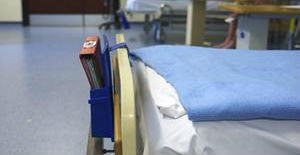While the NHS is struggling to meet the demands, both clinically and politically, it is right to focus on efficiency and reduce ‘delayed discharges’, sadly also termed ‘bed-blockers.’ Though much is known about the negative impact of inpatient stay on physical and mental health, the discharge must be at the right time, clinically safe, in discussion with the patient and family and with appropriate community support. However, social and community services are struggling to cope. Chronic underfunding has resulted in an overloaded and fundamentally broken system that has little capacity to support the concept of ‘care closer to home’ or speedier discharges. This has resulted in the phenomenon of some ‘unsafe discharges’, aptly termed ‘premature discharges’.
There are no robust safeguards in place to stop these premature discharges
A vulnerable patient who is not ready, risks being pushed out by the conveyor belt of the discharge process in a rush to create beds. Clinicians can also be left vulnerable to make decisions to discharge patients sooner than when they feel necessary. Patients and their families increasingly complain about how they/their relative were discharged when still weak, confused or unwell. Such ‘premature discharges’ are not only distressing and harmful but are also not cost-effective.
The Royal Voluntary serviceman charity highlighted this in their report called ‘Going home alone’. The Kings Fund was also quoted ‘in the rush to solving delayed discharges we may be inadvertently moving people on too quickly from hospital’.
Currently, there are no robust safeguards in place to stop these premature discharges from the hospital. The controversial penalties for readmissions within 28 days appear to have had limited impact.
On the other end of the spectrum, there are cases where the patients stay longer than needed due to patient or family choice. Anecdotally, this is more often seen in psychiatric inpatients. Fear of reprisal or complaint can hold back the clinicians or the discharge teams from making a timely discharge. It has been reported that patient or family choice is the third highest cause of delayed discharges i.e. up to 9% of the total discharges. The reasons are multifactorial and complex. We believe that the incidence of such cases may be under-reported. The recent case of a hospital inpatient for more than two years has been a shocking. Economic impact of such cases cannot be understated at the times of serious financial pressures.
There is a real pressing need for more resource in the community to support early discharges and it remains in the control of the political powers to urgently take a lead on this.
But, the issue of premature or delayed discharges does raise a serious question about the need for a mechanism or an arbitration process to help find the right balance.
In psychiatry, patient may be admitted into the hospital for treatment against their wishes after an assessment by a formal panel. Yet, a similar mechanism around discharge against wishes is lacking. Under such a mechanism, the patient or the family will have an avenue to voice their concerns against the decision to be discharged if felt that it is the not the right decision. At the same time, this will empower the discharge teams to make more timely decisions with confidence and less worry about any backlash.
This may be in form of another independent clinician/manager to review the decision other than the discharging clinician or in the shape of a formal panel. Any contentious discharges where a second opinion is warranted at the request of the patient/family or the discharge team can be referred to such a panel. This panel should also include a lay member of the public as a patient representative. This manpower exists in most hospitals in various forms already and the system can be more than self-funding through the savings of more timely discharges and reduced readmissions. In fact, there is already some evidence that peer physician review reduces rate of readmissions.
And let us face it, more than ever, the financial pressures are influencing the patient-clinician encounters but there needs to be a line drawn for the safe and effective care of those whom we serve when mindful of the resources. Both premature and delayed discharges can prove expensive in form of morbidity, mortality and the economic cost. A formal process to find the right balance will boost the confidence of public and clinicians alike and ensure that the discharge is timely. If anything, such an arbitration process could apply across the wider spectrum of healthcare.

















